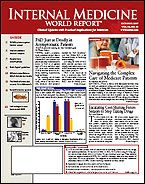Physicians Urged to "Lead by Example," Expand Flu Vaccination
No Vaccine Shortfalls Expected for 2007-2008 Season
No Vaccine Shortfalls Expected for 2007-2008 Season
By Laura Brasseur
WASHINGTON, DC—"Despite the fact that we have influenza vaccine, we are still failing to protect a large proportion of people," said Julie L. Gerberding, MD, MPH, director of the Hospital Infections Program, Centers for Disease Control and Prevention, at a news conference, in which the encouraging vaccine supply projections stood in stark contrast to the discouraging data on immunization rates.
Many physicians may be suffering from "flu vaccine fatigue," but each year, influenza accounts for more than 200,000 hospitalizations and about 36,000 deaths in the United States. Furthermore, it drains the economy of more than $87 billion in healthcare costs and lost productivity.
Dr Gerberding presented new data on vaccine coverage rates for the 2005-2006 flu season, showing that only about one third of children—the age-group with the highest influenza infection rates—were fully vaccinated. And just 30% of adults aged 18 to 64 years with high-risk conditions, such as diabetes, asthma, and heart disease, were immunized—a rate well below the national target of 60%.
Among older adults, who are at especially high risk for influenza-associated morbidity and mortality, immunization rates were 36% for those aged 50 to 64 years and 60% for those aged ≥65 years. "This is concerning, since this is the only available prevention method against this seriously life-threatening disease," noted Robert H. Hopkins, Jr, MD, of the University of Arkansas for Medical Sciences, Little Rock.
Speakers urged physicians to "rethink" the influenza season and start vaccinating patients as early as October and continue through May.
The vaccine supply is expected to be plentiful this season, with manufacturers shipping more than 130 million doses in the next few months.
"Healthcare professionals and their patients must work together to make sure every opportunity to discuss influenza immunization and receive the vaccine is used," emphasized Ardis D. Hoven, MD, of the American Medical Association. She urged physicians to lead by example, lamenting that only about 40% of healthcare professionals are immunized against influenza.
The FDA announced at the conference that it was expanding the indications for the intranasal flu vaccine (FluMist) to include children aged ≥2 years. Until now, this vaccine was indicated for children and adults aged 5 to 49.
Dr Gerberding hailed this development as another opportunity for expanding vaccine coverage.
